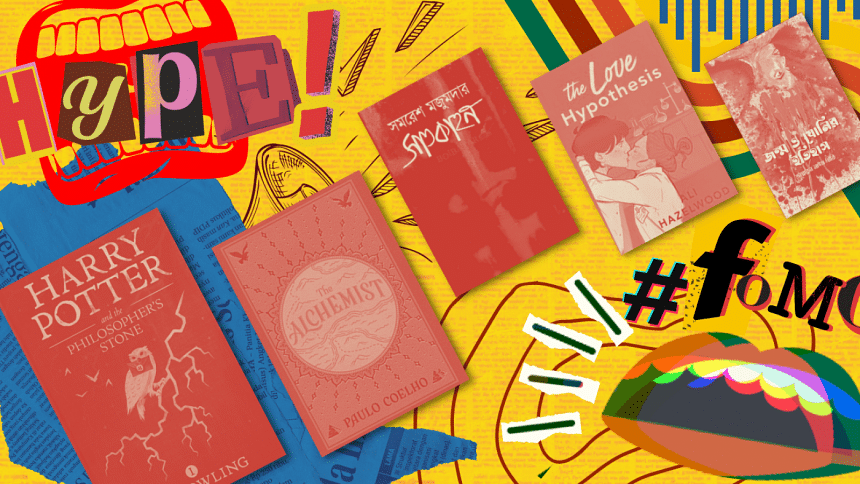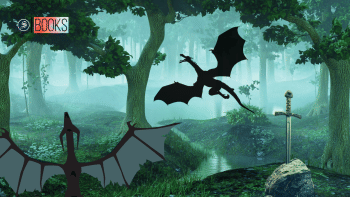The thing about popular and overhyped books

"Overhyped books are the empty calories of the literary world."
Kevin Ansbro, Author (Goodreads)
Overhyped books are one of the big players in the publishing industry. They are books that are heavily promoted and marketed on social media by book bloggers and reviewers, often with large budgets, to generate buzz and anticipation among readers. However, when the book is finally released, sometimes it fails to live up to the hype.
In some cases, the book may be genuinely good, but the wait for it has set expectations too high, leading to disappointment among readers. For instance, the Harry Potter series. How many of us read it and didn't enjoy it? The series and its author JK Rowling has been a tale of inspiration for many aspiring writers across the world. All she had to do was get her first novel, Harry Potter and the Sorcerer's Stone published, which was a great struggle. The commercial success and the genuine, positive reviews gave it all the fame it deserved. But the other titles of the series were anticipated by readers, and they were already successful and bestsellers even before they were written (particularly the last ones). Although the whole series is a success, the readers' opinions and emotions vary. Most readers loved it, but a lot of people do consider them overrated. However, years later, when Rowling is a billionaire, this much loved series is now under scrutiny for its author's personal views. As more people are reading and rereading them, the lack of diversity and inclusion, the stereotypical attributes of the characters who aren't white is very evident. In other words, though the Potterverse is loved and well established, it is now a matter of great debate if these books are worth the hype or not, considering this book has been made famous by fans themselves.
Professor Kaiser Haq, PhD, a Bangladeshi translator, critic, poet, and the Dean, School of Arts and Humanities at University of Liberal Arts Bangladesh (ULAB) deconstructed the phenomenon of hype, stating, "Hype depends on all the factors that are at play in the public sphere-geopolitics, local concerns and obsessions, the hunger for sensationalism, and what have you. It will be a mistake to regard hype as the major determinant of literary and artistic reputation. More often than not hype will produce a nine days' wonder. A great writer or artist (Joyce, Virginia Woolf, Picasso) is assured a secure position in the estimation of critics as well as the discerning public while many a hyped producer of printed or visual matter quietly fades into oblivion."
Thinking back, I recall my friends and classmates from undergraduate days quoting excerpts from Paulo Coelho's The Alchemist (1988), which I felt they were doing just to look cool. Months later, when I started reading it for myself, my mind was blown. I was fascinated by the way the novel portrayed how we manifest our dreams into reality. I was going through a bad breakup and reading that novel was a reassurance of all the positive things I would embrace in my life, because that's what the power of destiny is. Later, I embarked upon a journey of recommending Coelho's books, The Alchemist (1988), and Veronica Decides to Die (1998) to everyone. It was a shock when I realised that there are people who hated his books! During a casual discussion at work, my supervisor, an avid reader and mother of a budding avid reader, mentioned how she didn't quite like The Alchemist, because she felt the narrative was pretentious and not lyrical. To her, the philosophical ideas that the book held felt forced and unspontaneous. The admission made me realise the fact that people don't always quite enjoy reading popular books (or books written by famous artists). Most importantly, the taste in genres differs from person to person depending on their choice, mood, or current circumstances.
There are several reasons why a book may be overhyped. It could be due to the popularity of the author, the subject matter, the publishers' or bookstores' desire to make a profit, especially when they see its potential to turn into a cultural phenomenon, or when a movie or TV series is adapted from a book. Amina Rahman, Managing Director of Bookworm Bangladesh stated, "From a book seller's perspective, sometimes we purchase and buy books we personally read and loved. Through sheer passion—at times self-belief—we may bring a lot of copies of that book and publicise it or "hype" it more so that people get the opportunity to read an excellent piece of literature. The whole phenomenon is partly passion and partly measuring the new trends and capturing that ride, not wanting to miss out."
When Iffat Nawaz was asked regarding her debut novel, Shurjo's Clan, which gained a lot of attention and positive reviews during the Dhaka Lit Fest held this year, she said, "Shurjo's Clan came out in November 2022 and some time before that Penguin (my publishers) had sent out early copies to selected folks—fellow writers, reviewers etc. So a decent number of people had the chance to read and review it for newspapers and magazines both in Bangladesh and in India. By the time DLF happened a month and half had already passed since its release and enough people had read it by then to talk about it to others. So I don't think the hype came before people read it, (if there is such a hype), I think whatever goodness Shurjo's Clan has received from the readers came from the way people related to it—especially in regards to how we process our inherited pasts -- which did not fully belong to us, a subject so relevant for our post '71 generation. Perhaps, because of my weekly column 'Under a Different Sky', which I had written for The Daily Star for 10 years, I had somewhat of a readership in Bangladesh and I was fortunate enough to get the love of those readers who picked up the book and passed it on to other . . . even though there had been a 10 year hiatus since those column days."
On one hand, popular books can be a great way to stay up to date with current trends and cultural conversations. They may also offer a sense of community, as many people may be discussing and analysing the same book. Additionally, popular books (both physical and electronic copies) are often widely available, making them easy to access and purchase. On the other hand, popular books may not always be the most high-quality or thought-provoking reads. Some popular books may be formulaic, overly simplistic, or lack depth.
In my opinion, as a passionate reader, the only problem with overhyped books is that they can overshadow other deserving books that receive less promotion and attention. Readers may miss out on great books because they are too focused on the latest overhyped release. Furthermore, overhyped books can also lead to a backlash among readers and critics, who feel that they have been misled. This can damage the reputation of the author, publisher, and even the entire industry.
Ultimately, there are great books who have attained immense popularity and turned out to be great reads. I have truly grasped the meaning of some books much later in life when I reread them, whereas there are books which invoked the same mixture of feelings after 15 years, that too, on my fifth read! For instance, the Harry Potter series, Great Expectations (1861), David Copperfield (1850), a few of Humayun Ahmed's famous books like Chayashongi, to name a few. Similarly, I have bought and read books by authors I have seldom heard of, but they turned out to be gems. And this made me put things into perspective: reading only popular books may limit your exposure to diverse perspectives and genres, and to be a well-rounded reader, you can always explore all sorts of popular and unpopular genres—after all, you can always have new favourites!
Salwah Chowdhury works at an NGO by the day and works for her toddler at night. In between she is trying to be the writer she always wanted to be. Please reach her at [email protected] or @salwah_chowdhury (IG) for any book recommendations or your thoughts on the article.

 For all latest news, follow The Daily Star's Google News channel.
For all latest news, follow The Daily Star's Google News channel. 









Comments